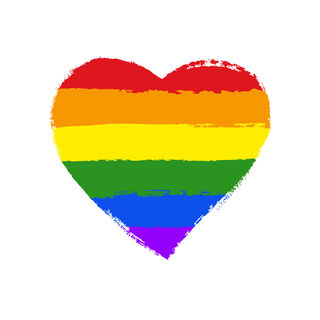Health
Why Do We Celebrate Pride Month?
Pride Month is not a frivolous party. It is a protest for equal rights.
Posted June 9, 2022 Reviewed by Vanessa Lancaster
Key points
- Although LGBTQ+ people have equal rights in liberal countries, it doesn't mean that discrimination disappeared.
- Pride is a protest for the human right to live free of fear of discrimination.
- Maintaining the well-being of LGBTQ+ people is an ongoing process because homophobia, biphobia, and transphobia are ongoing.

June is Pride Month. It is the beginning of Pride Season. Cities around the world celebrate Pride events throughout the summer. You might notice many companies changing their logos to the rainbow colours, also called the Progress Flag, which represents the diverse communities of genders, sexualities, and relationships. You might also notice these communities getting together and partying. From an external eye, it might seem frivolous. Indeed, some even ask, "Why do they need a Pride Month? They now have equal rights! Stop shoving it in my face."
The True Picture
Here, in the United Kingdom, our LGBTQ+ communities now have equal rights, which means that we are protected by law against hate crimes. However, the legal protection doesn’t mean that homophobia, biphobia, and transphobia disappeared.
Although on the surface, it seems that all is well now and that LGBTQ+ people can live a safe and happy life in the United Kingdom, the actual true picture is quite different. According to a report by Galop, 64 percent of LGBT+ people experienced anti-LGBT+ violence and abuse. Nine in 10 of the respondents to the survey reported being negatively impacted by their experiences of anti-LGBT+ abuse. The report states:
The impacts and consequences experienced were wide-ranging and included physical injuries, emotional and psychological impacts, financial costs and behaviour changes.
Moreover, the report highlights that 45 percent of the respondents said they required emotional support.
A report from Stonewall shows that 13 percent of LGBT people experienced some form of unequal treatment from health care staff because of their sexual orientation. A worrying 70 percent of trans people reported being impacted by transphobia when accessing general health services.
At school, 42 percent of LGBTQ+ pupils reported having been bullied in the past year, double the number of non-LGBTQ+ pupils. At universities, 42 percent of LGBTQ+ students have said that they have hidden their sexual orientation for fear of discrimination. At work, 35 percent of LGBTQ+ staff said the same.
An independent review by the charity organisation Just Like Us found that 7 in 10 (68 percent) LGBT+ young people said their mental health has worsened since the pandemic began, compared with half (49 percent) of non-LGBT+ young people.
This is the picture in the United Kingdom, a liberal country. Other liberal countries such as France, Germany, and Australia will have similar figures. Of course, there are some liberal countries that are trying to become less liberal—for example, as it is the case in the state of Florida in the United States, where the bill "Don’t Say Gay" will restrict schools from teaching students about sexual orientation and gender issues.
This is history repeating itself as we can all remember the United Kingdom had a similar legislation with Thatcher’s Section 28. What we know from this side of the pond is that, although now repealed, Section 28 caused much harm to the LGBTQ+ communities, and its echo is still felt today as many LGBTQ+ people still live with core beliefs that they are "worthless" or "not good enough," the kind of shame-inducing beliefs that have tremendous negative impacts on people’s mental health and quality of life, a familiar theme for queer therapists like me working with our populations.
Whether we want to acknowledge it or not, being an LGBTQ+ person in our modern world is not easy. Navigating an inhospitable world, as well as being in constant vigilance because of the expectation of discrimination, is still very much part of the everyday lives of the LGBTQ+ people living in liberal countries such as the United Kingdom. For example, the simple act of holding the hand of your romantic partner in the streets isn’t even a thought for heterosexual people, whereas, for LGBTQ+ people, it is an everyday safety consideration and a decision made after careful scanning of the environment for potential attacks.
For these reasons and more, Pride Month is very important and is still needed. Pride events may look like hedonistic parties, but they are not. They are a protest, an act of defiance for our full acceptance, visibility, and, most of all, our human right to feel safe where we live, without fear of being discriminated against at school, universities, workplace, in the streets, in shops, or with our health care.
The Fuller Picture
Heterosexual people have the privilege to have the entire world open to them. It is not the case for LGBTQ+ people.
According to The Human Dignity Trust, 71 countries criminalise same-sex relationships. Eleven of those countries impose the death penalty for LGBTQ+ people. A quarter of the world’s population believes that being LGBT should be a crime. For example, while heterosexual people may travel to a sunny and luxurious holiday anywhere in the world without even thinking about it, some of those destinations are dangerous for LGBTQ+ people. I would love to see the pyramids in Egypt, but, currently, if I go there, I could be criminalised and face three years in prison. I won’t risk it.
Family of Choice
Unfortunately, we still hear of LGBTQ+ people being thrown out of their homes and disowned by their families. It is very much happening in the here-and-now, even here in the United Kingdom. For the LGBTQ+ people who are rejected by their family, it is possible to find a family of choice (or tribe). It sounds easy, but it is not. It can be hard for LGBTQ+ people. It is a challenge to allow ourselves to be loved by a family of choice if we feel we’re not worthy of that love.
Learning to love ourselves is possible, and it is an ongoing process.
Loving Ourselves
In my work, I often ask my clients to pay attention to their thoughts because we can easily beat ourselves up: I’m not good enough. I’m stupid. Nobody cares. I will never find someone who loves me.
When I help my clients notice those "beating-up thoughts," I also encourage them to argue with those thoughts as though they’re arguing against a bully: You’re not worthless! You’re just as good as anyone else. You are loveable.
Sometimes, we also need to give ourselves the opportunity to rest and soothe with thoughts such as Slow down. Rest. Let’s have a lovely mug of tea. Or pick up the phone and call a trusted friend. It is important to remind ourselves that we aren’t a burden to a good friend, and good-quality queer connections (or tribe) are essential to our well-being.




